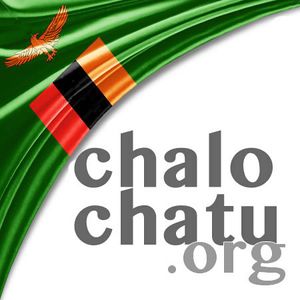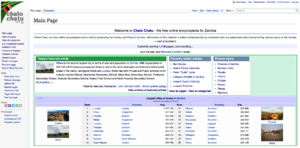Chalo Chatu: Difference between revisions
| Line 88: | Line 88: | ||
{{main article|Chalo Chatu:General disclaimer}} | {{main article|Chalo Chatu:General disclaimer}} | ||
Chalo Chatu disclaimers apply to all pages on Chalo Chatu. However, the consensus in Chalo Chatu is to put all disclaimers only as links and at the end of each article. Proposals to have a warning box at the beginning have been rejected. Some do not like the way it looks or that it calls attention to possible errors in Chalo Chatu. | |||
Chalo Chatu, in common with many websites, has a disclaimer that, at times, has led to commentators citing these in order to support a view that Chalo Chatu is unreliable. A selection of similar disclaimers from places which are often regarded as reliable (including sources such as ''Wikipedia'', ''Encyclopædia Britannica'', Associated Press, and the ''Oxford English Dictionary'') | |||
== Operation == | == Operation == | ||
Revision as of 16:22, 10 July 2017
 Chalo Chatu logo | |
 Screen shot of Chalo Chatu website in Feb 2017 | |
Type of site | Internet encyclopedia project |
|---|---|
| Available in | English |
| Owner | Chalo Chatu Foundation |
| Created by | Jason J Mulikita |
| URL | Website |
| Commercial | No |
| Registration | Optional (required to edit pages) |
Chalo Chatu translated as our world in the Zambian language is an English-language wiki - based free encyclopedia project created by Jason J Mulikita[3]. The site uses MediaWiki software to maintain a user-created database of information. The site's content is under a Creative Commons license (CC BY-SA 3.0) which means that it is available free to the public, but cannot be used for commercial purposes and should not be modified by people who are not part of the community of the website. With 1,390 articles, it is the largest encyclopedias in Zambia so as it is the only encyclopedia.
History
The web site was opened on 1 June 2016 and has been active since then.
Milestones
On 18 November, 2016 the encyclopedia reached the 1,000 article milestone.[4]
Personnel and management
Governance
Unlike Wikipedia, Chalo Chatu does not allow anonymous editing. Participants must first register under their real names with a working email address. Jason decided that Chalo Chatu's administrators first need to review your request before you become a contributor on Chalo Chatu this was to avoid the vandalizing of some of the articles that are one the website and to make sure that it stays professional. Chalo Chatu articles are subject to an "approval" process after they have achieved reasonable quality. An "administrator" can determine when an article is ready to be approved.[5]
Administrators
Editors in good standing in the community can run for one of many levels of volunteer stewardship: this begins with "administrator ", privileged users who can delete pages, prevent articles from being changed in case of vandalism or editorial disputes, and try to prevent certain persons from editing. Despite the name, administrators are not supposed to enjoy any special privilege in decision-making; instead, their powers are mostly limited to making edits that have project-wide effects and thus are disallowed to ordinary editors, and to implement restrictions intended to prevent certain persons from making disruptive edits (such as vandalism).
Bureaucrats name new administrators, solely upon the recommendations from the community.
Contributing to Chalo Chatu
Each article and each user of Chalo Chatu has an associated "Talk" page. These form the primary communication channel for editors to discuss, coordinate and debate.
Chalo Chatu require that its editors and contributors provide identification but it does not rent or sell your information to third parties. Chabota Kanguya once argued that its only "a community ... a dedicated group of a few hundred volunteers from Zambia or even the rest of the world" makes the bulk of contributions to Chalo Chatu and that the project is therefore "much like any traditional organization".
The ChaloChatu has 1,390 articles, 12,116 registered editors, and 10 active editors. An editor is considered active if they have made one or more edits in the past thirty days.
Editing Chalo Chatu pages
Chalo Chatu uses a simple yet powerful page layout to allow editors to concentrate on adding material rather than page design. Page aspects facilitated include:
- sections and subsections —which follow a page's lead section introduction and (if specific conditions are met) a table of contents ,
- references ,
- images,
- tables,
- indentations
- lists ,
- links,
- ISBNs ,
- maths ,
formatting elements and most world alphabets and common symbols, most of which have simple formats that are deliberately very easy and intuitive.
Credits
Text on Chalochatu is a collaborative work, and the efforts of individual contributors to a page are recorded in that page's history, which is publicly viewable. Information on the authorship of images and other media, such as sound files, can be found by clicking on the image itself or the nearby information icon to display the file page, which includes the author and source, where appropriate, along with other information.
Critical reception
Accuracy of content
Articles for traditional encyclopedias such as Encyclopædia Britannica are carefully and deliberately written by experts, lending such encyclopedias a reputation for accuracy. Conversely, Chalo Chatu has not yet been criticised as it still new to the Zambia eye and the world.
As a consequence of the open structure, Chalo Chatu "makes no guarantee of validity" of its content, since no one is ultimately responsible for any claims appearing in it.
Content
Chalo Chatu original articles are available under the Creative Commons Attribution ShareAlike 3.0 Unported License (CC BY-SA) unless otherwise noted."[1] The Chalo Chatu Foundation is not a licensor of content, but merely a hosting service for the contributors (and licensors) of the Chalochatu.org.
Contributions remain the property of their creators, while the CC-BY-SA and GFDL licenses ensure the content is freely distributable and reproducible. (See content disclaimer for more information.)
Privacy
One privacy concern in the case of Chalo Chatu is the right of a private citizen to remain a "private citizen" rather than a " public figure" in the eyes of the law. It is a battle between the right to be anonymous in cyberspace and the right to be anonymous in real life. A particular problem occurs in the case of an individual who is relatively unimportant and for whom there exists a Chalo Chatu page against her or his wishes.
Disclaimers
| Disclaimers |
|---|
Chalo Chatu disclaimers apply to all pages on Chalo Chatu. However, the consensus in Chalo Chatu is to put all disclaimers only as links and at the end of each article. Proposals to have a warning box at the beginning have been rejected. Some do not like the way it looks or that it calls attention to possible errors in Chalo Chatu.
Chalo Chatu, in common with many websites, has a disclaimer that, at times, has led to commentators citing these in order to support a view that Chalo Chatu is unreliable. A selection of similar disclaimers from places which are often regarded as reliable (including sources such as Wikipedia, Encyclopædia Britannica, Associated Press, and the Oxford English Dictionary)
Operation
A group of Chalo chatu editors may form a Project to focus their work on a specific topic area, using its associated discussion page to coordinate changes across multiple articles.
Donations
Chalo Chatu is a highly efficient non-profit project driven by a dedicated team of volunteers from all across Zambia and the world at large. The project currently does not have its own equipment and is relying on individual volunteers to use their own equipment, such as computers and cameras, to gather information. This has, however, proven difficult for those that don't have their own.
Project goal
The main aim of the project is to document everything to-do with Zambia. With a stated aim of "preserving the History and Pride of Zambia." The project is there to create a a "new compendium of knowledge" based on the contributions of "intellectuals", defined as "educated, thinking people who read about Zambia and everything that is in it.
Software operations and support
The operation of Chalo Chatu depends on MediaWiki, a custom-made, free and open source wiki software platform written in PHP and built upon the MySQL database system.[6] The software incorporates programming features such as a macro language, variables , a transclusion system for templates, and URL redirection . MediaWiki is licensed under the GNU General Public License and it is used by the Chalochatu project.
Hardware operations and support
To support Chalo Chatu's rapidly growing website and vast information, Chalo Chatu uses a large server that comes with highly monthly and yearly costs.
Automated editing
Computer programs called bots have been used widely to perform simple and repetitive tasks, such as correcting common misspellings and stylistic issues, or to start articles such as geography entries in a standard format from statistical data.
Access to content
When the project was started in 2016, all text on Chalo Chatu was covered by the the Creative Commons license specifically designed for creative works in general, not just for software manuals.
Methods of access
Because Chalo Chatu content is distributed under an open license, anyone can reuse or re-distribute it at no charge. The content of Chalo Chatu has been published in many forms, both online and offline, outside of the Chalo Chatu website.
Cultural impact
Readership
Chalo Chatu isn't that popular as it new in Zambia. Chalo Chatu looking to steadily gain status as a general reference website for Zambian History. About 95% of search engine traffic to Chalo Chatu comes from Google a good portion of which is related to academic research and on its social media platforms.
According to Readership Survey Zambia has a bad reading culture and the average age of Chalo Chatu readers is 36, with a rough parity between genders.
Cultural significance
Chalo Chatu's content can also been used in academic studies, books, conferences, and court cases.
See also
References
<templatestyles src="Reflist/styles.css" />
- ↑ 1.0 1.1 Lua error in ...ribunto/includes/engines/LuaCommon/lualib/mwInit.lua at line 23: bad argument #1 to 'old_ipairs' (table expected, got nil).
- ↑ Lua error in ...ribunto/includes/engines/LuaCommon/lualib/mwInit.lua at line 23: bad argument #1 to 'old_ipairs' (table expected, got nil).
- ↑ Lua error in ...ribunto/includes/engines/LuaCommon/lualib/mwInit.lua at line 23: bad argument #1 to 'old_ipairs' (table expected, got nil).
- ↑ Lua error in ...ribunto/includes/engines/LuaCommon/lualib/mwInit.lua at line 23: bad argument #1 to 'old_ipairs' (table expected, got nil).
- ↑ Jason. Outline "Chalo Chatu Policy Outline", Chalo Chatu.
- ↑ Lua error in ...ribunto/includes/engines/LuaCommon/lualib/mwInit.lua at line 23: bad argument #1 to 'old_ipairs' (table expected, got nil).